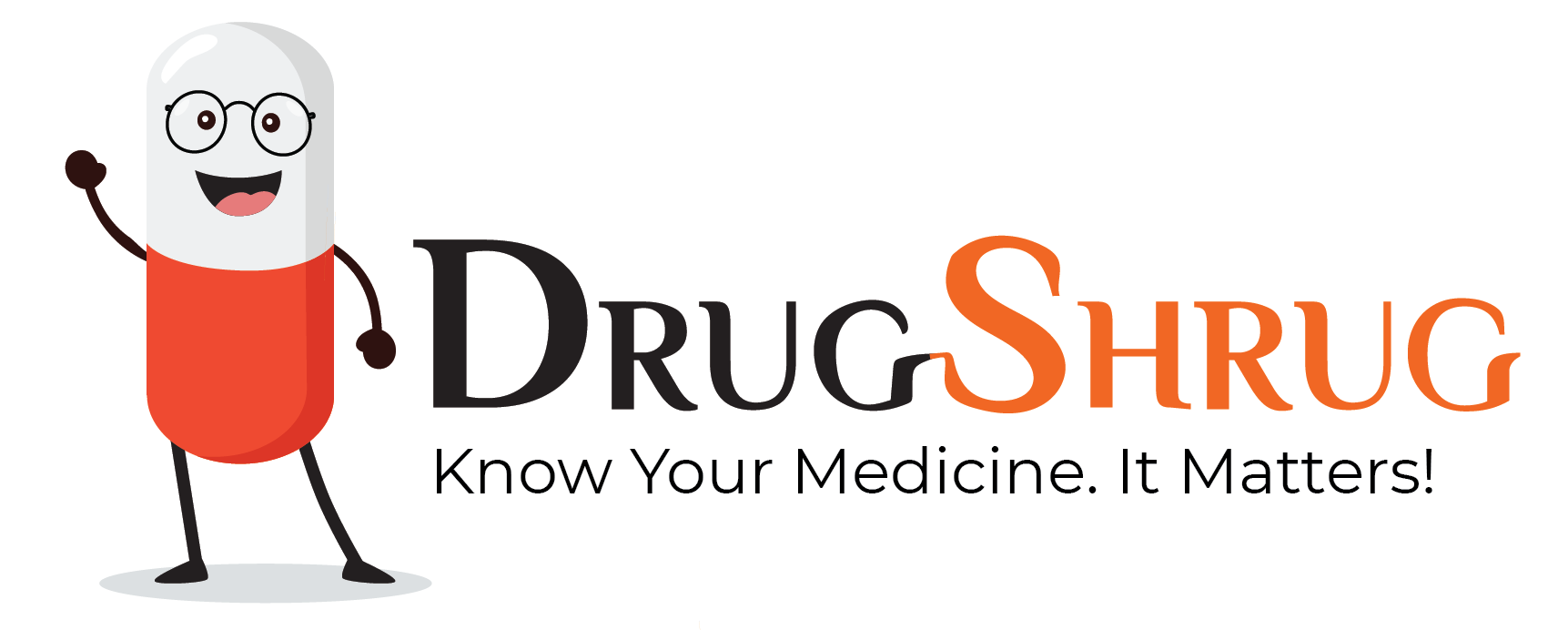What is Labetalol?
Labetalol is a beta-blocking agent that impacts heart and blood circulation through veins and arteries. It is prescribed cure condition of high blood pressure [hypertension].
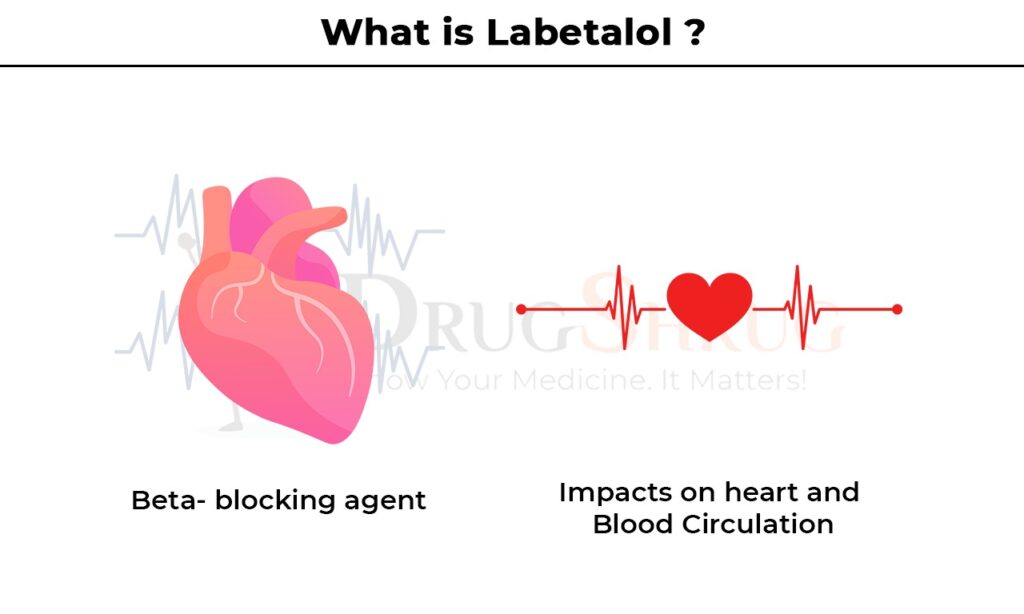
It is often administered in tandem with other blood pressure medicines as well. This injection is recommended only in severe cases of hypertension. It may also be utilized for purposes not mentioned in this concise clinical guide.
What are the common conditions in which Labetalol prescribed?
This drug is a beta-blocker which is recommended to treat severe hypertension.
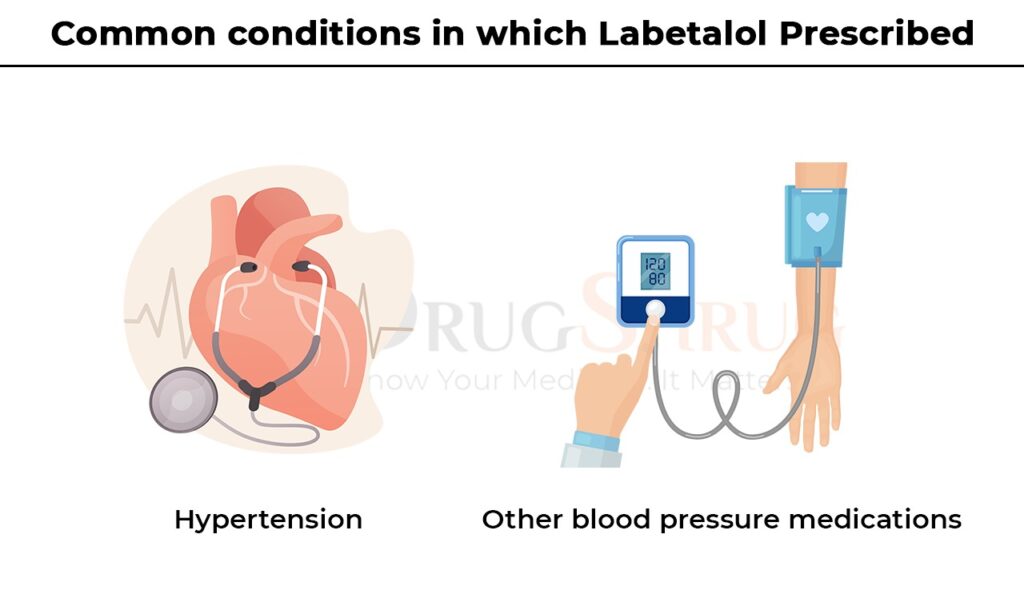
It is also used in combination with other blood pressure medications.
How should I take Labetalol?
Adhere strictly to the guidelines of your doctor and as mentioned on the prescription label. Your doctor may frequently alter your dose. Take the medicine as per the directions only. Labetalol oral is administered by mouth. While the injection is directly inoculated into a vein in case of grave hypertension. This injection shall be provided to you by your clinician. After getting the IV infusion, you may be asked to stay in lying position until 3 hours. The instant you stand up after the treatment is over you may feel slightly dizzy. You may often undergo certain medical tests, blood pressure checks, and blood tests.
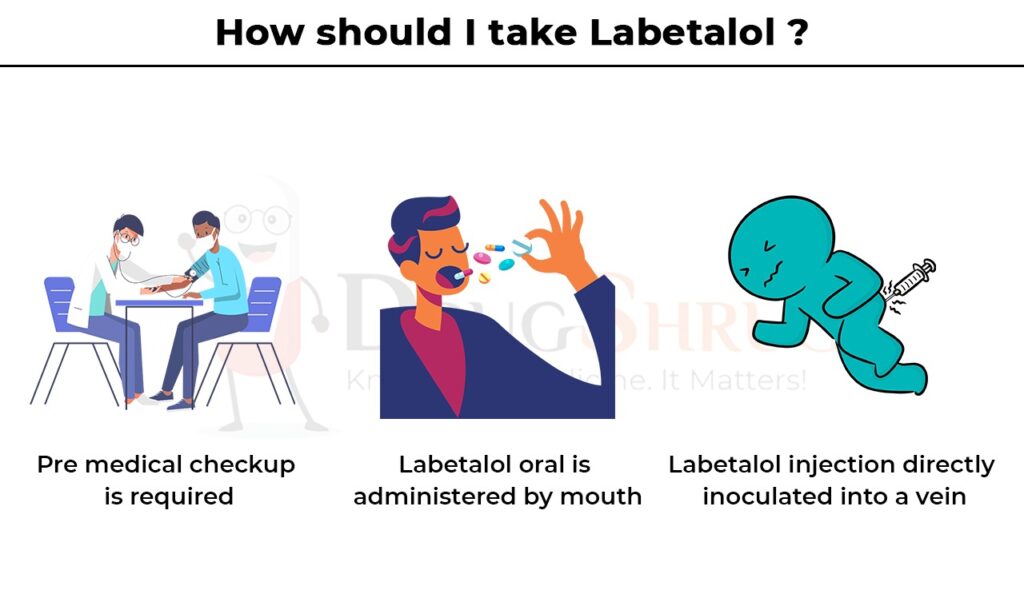
Continue to take the medicine for recommended period even though the symptoms start showing improvement. You might need to take blood pressure medications for a lifetime. If you are using this medicine, it may be difficult to identify your low levels of blood sugar.
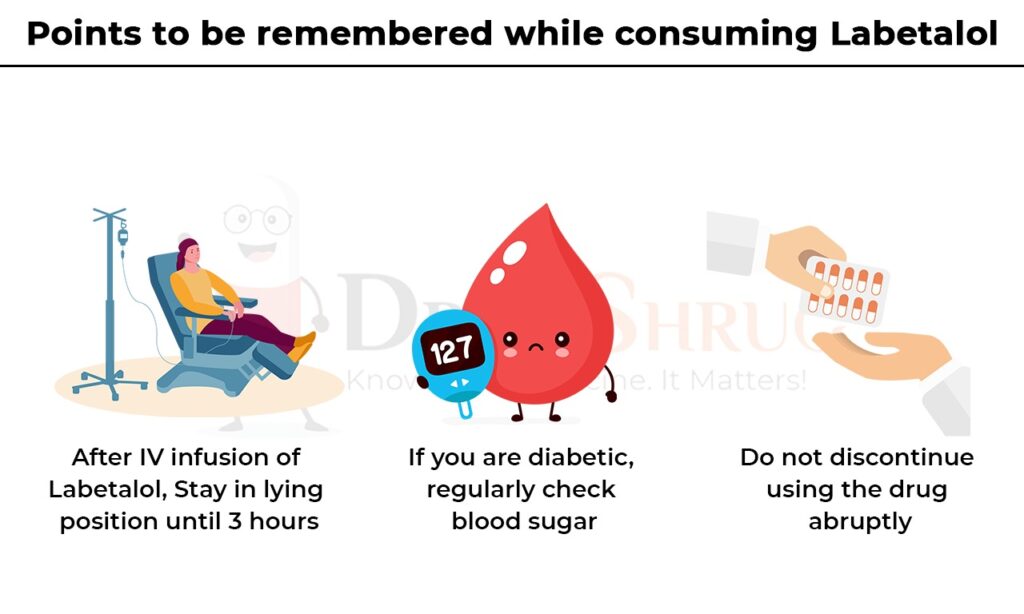
Thus, if you are diabetic, regularly check blood sugar. This drug can give wrong outcomes with particular laboratory tests of the urine. It can also impact a drug-screening urine assessment, and you may deliver incorrect results.
Therefore, apprise the test centre staff that you take labetalol. In case you have to undertake any surgery, inform your surgeon beforehand about your usage of this medicine. Do not discontinue using the drug abruptly as it may aggravate your condition. Place at room temperature in a cool and dry area.
When you should not take Labetalol?
Avoid taking this medicine if you suffer from severe cardiac ailments [2nd or 3rd degree “AV block”], low blood pressure, slow heartbeats, uninhibited heart failure, or asthma.
Do not take this drug if you are hypersensitive to it or if you have:
- asthma;
- “AV block” (2nd or 3rd degree);
- uncontrolled heart failure;
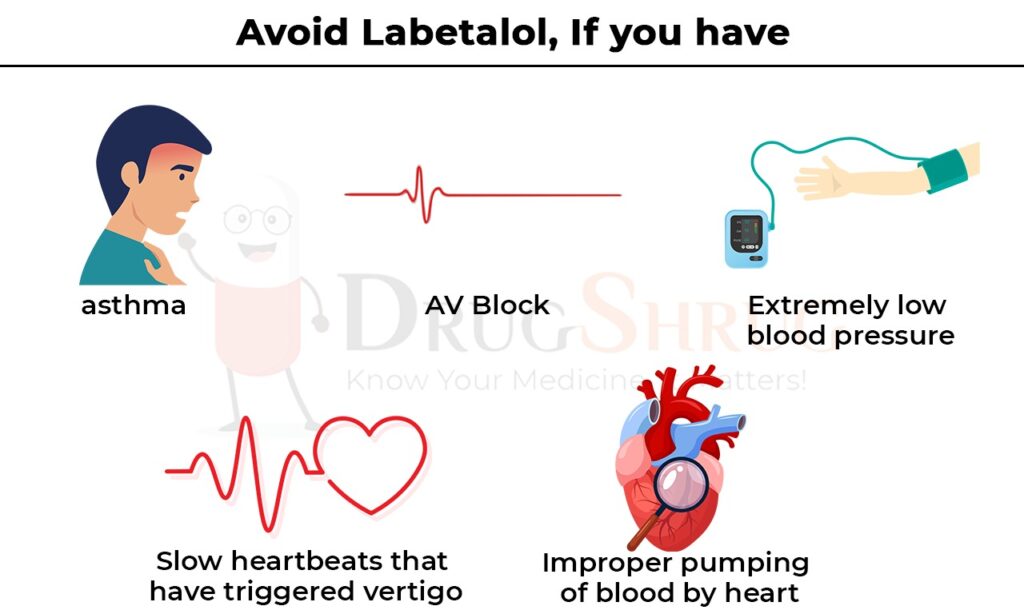
- extremely low blood pressure;
- slow heartbeats that have triggered vertigo; or
- Improper pumping of blood by heart
Apprise your doctor if you have faced:
- congestive heart failure;
- angina (chest pain);
- hepatic [liver] ailments;
- emphysema, chronic bronchitis, or other breathing troubles,
- Pheochromocytoma (adrenal gland tumour);
- Diabetes mellitus;
- coronary artery bypass surgery (CABG);
- kidney problems; or
- allergies
Using this medication may impact your pupils while having cataract surgery. Acquaint your optic surgeon beforehand about your usage of labetalol. It is yet unknown if this medication will have any bad effect on the unborn infant.
However, taking the medicine during your pregnancy might inflict breathing problems, low blood sugar, meek heartbeat or, low blood pressure in a newborn. Inform your clinician if you are pregnant, or you are about to expect in near future. It might not be a secure option to take this medicine while you are suckling your child. Enquire from your healthcare provider about the related risks.
Labetalol has not been sanctioned to be tried by someone less than 18 years old. Unless you are unaware of the possible effects of this medicine on you do not drive or engage in any dangerous activity. It may impair the responses of a person. Do not stand up abruptly from a lying or sitting position as you might get dizzy. Consuming alcohol can further lower your blood pressure level and could increase adverse responses or side effects of this drug.
What are the possible side effects ?
If you experience symptoms of allergic response to the medication such as hives, problematic breathing, inflammation on face, lips, throat and tongue, then seek immediate medical attention.
Visit your clinician urgently if you get the following symptoms:
- Intense dizziness
- Meek pulse rate, slow heart rate, shallow breath [breath might even stop], faints
- Short breath even with slight effort, inflammation, quick weight gain;
- Extreme headache, hazy vision, thrashing in your neck or ears; or
- liver issues: lack of appetite, stomach ache (upper-right side), flu-like symptoms, itching, dark urine, jaundice (paling of the skin or eyes).
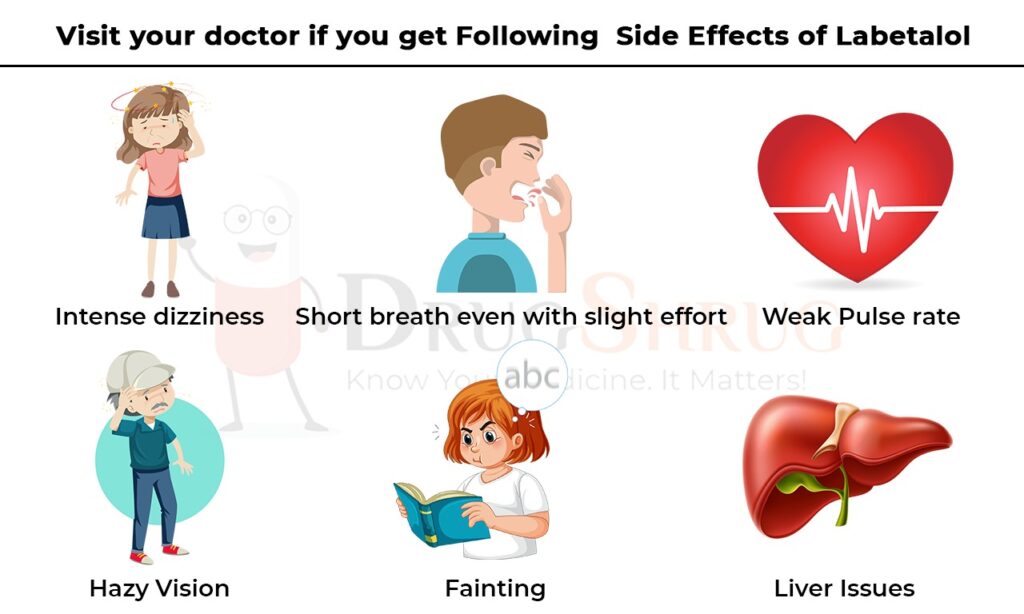
Critical dizziness or fainting is more possible senior adults.
Common side effects may comprise:
- Light headedness, sleepiness, fatigue
- nausea, vomiting;
- swift warmth, skin redness, sweating;
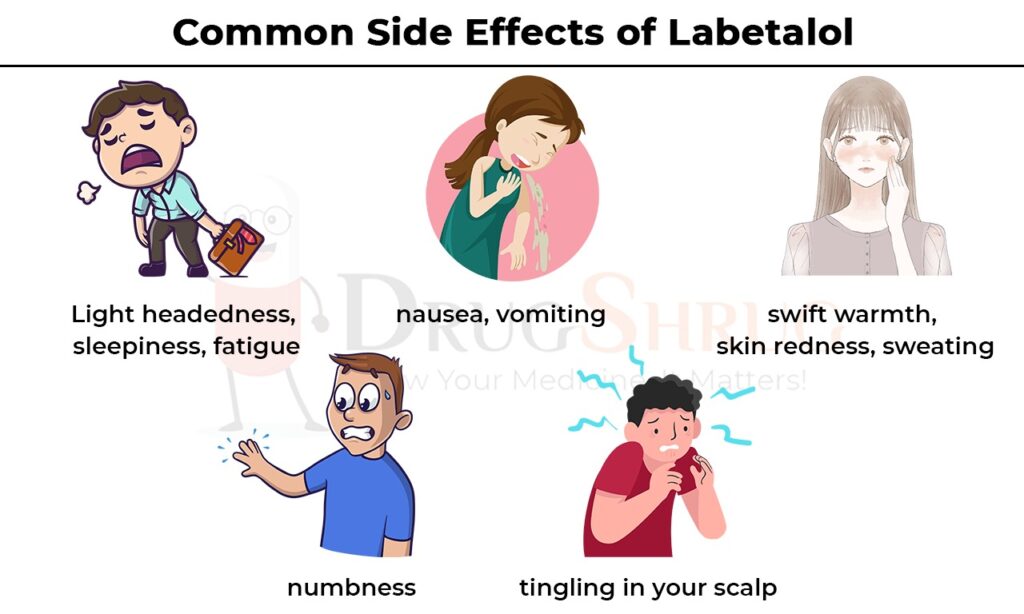
- numbness; or
- tingling in your scalp.
These are not all possible side effects as others may occur as well. Talk to your doctor for further information about side effects.
What to do if I miss the dose?
Labetalol oral
Always try to be punctual in taking your medicine. Although if you miss the dose for any reasons just skip it if it is almost time for your subsequent dose. Refrain from taking two doses at a time.
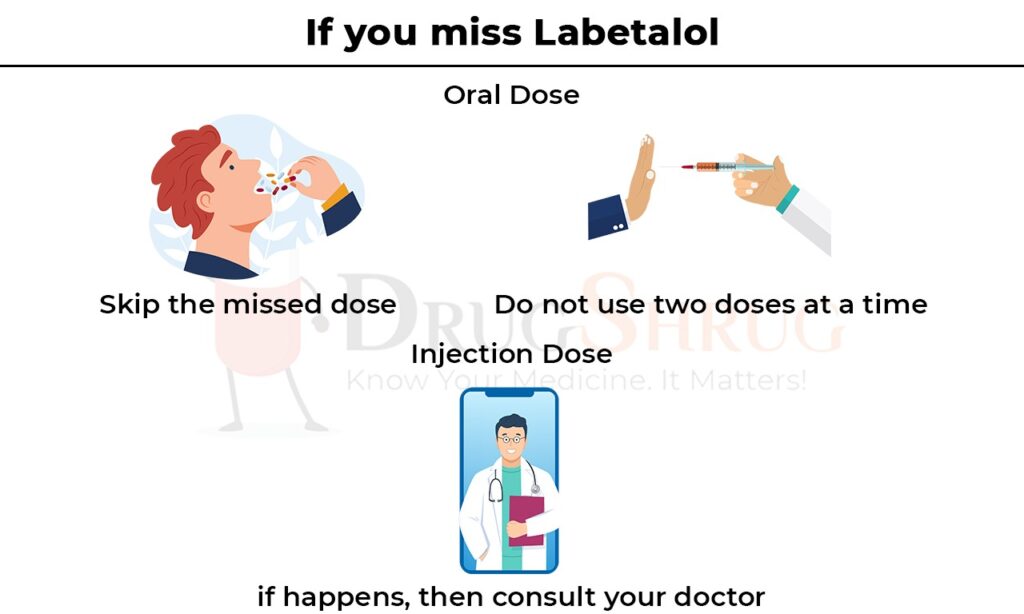
Labetalol injection
Since the medicine will be administered in a clinical setting, it is probable that you shall not miss a dose.
Common Drug Interaction
Inform your clinician about all other medications you take, particularly:
- blood pressure drug;
- aminophylline, theophylline;
- cimetidine;
- heart medication;
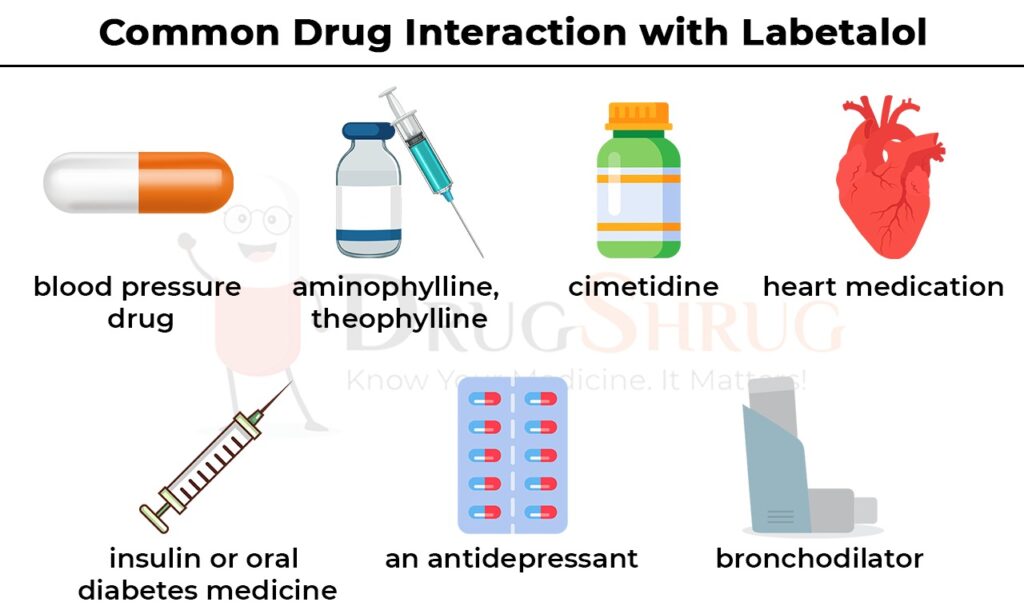
- insulin or oral diabetes medicine;
- an antidepressant–amitriptyline, doxepin, desipramine, imipramine, nortriptyline, and others;
a bronchodilator–albuterol, formoterol, levalbuterol, metaproterenol, olodaterol, salmeterol, and others. This however, is not an exhaustive list of the drugs that may influence labetalol. Inform your medic about all medicines you take, together with prescription and over-the-counter drugs, vitamins, and herbal supplements.
Bottom Line
This medicine is a beta-blocker agent used to treat serious stages of hypertension [high blood pressure]. Follow the directions of your doctor closely while administering the drug. If you observe any side- effects immediately visit your doctor.
Further Reading:
